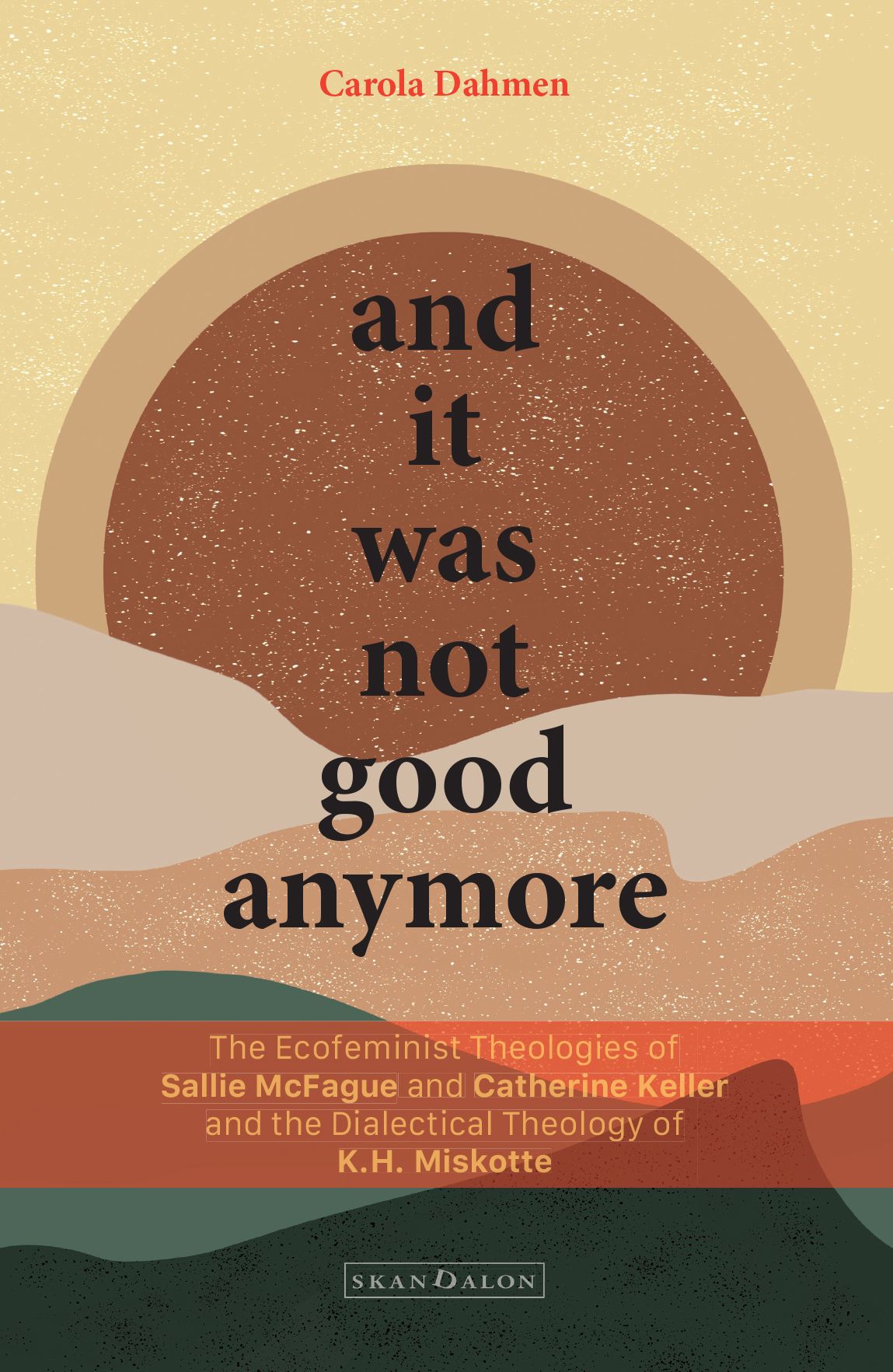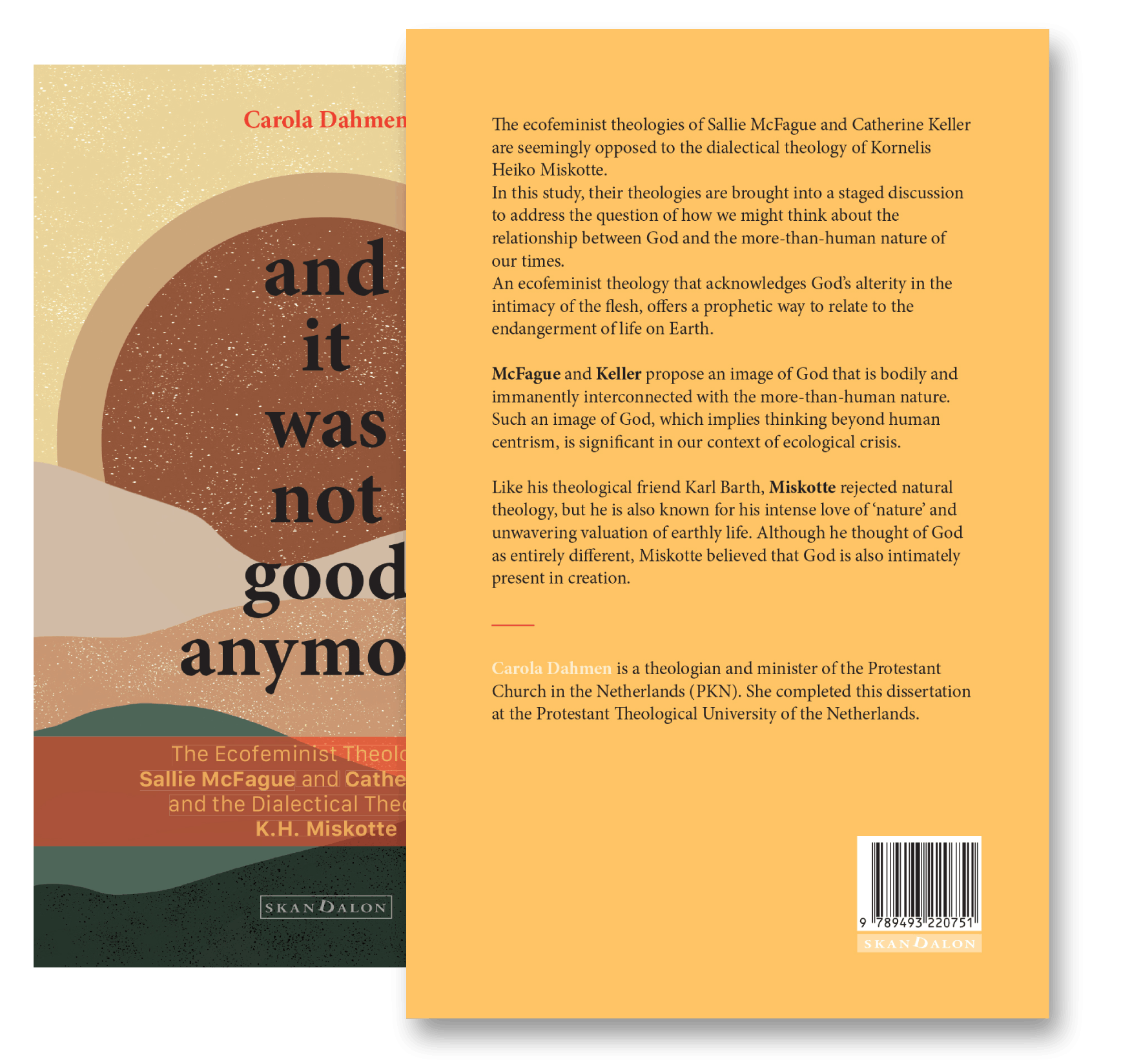Carola Dahmen
Und es war nicht gut mehr
Die ökofeministischen Theologien von Sallie McFague und Catherine Keller stehen scheinbar im Gegensatz zur dialektischen Theologie von Kornelis Heiko Miskotte.

Ein Wort vom Autor
Carola Dahmen, geboren 1985 in Wiesbaden, Deutschland, hat einen vielseitigen Hintergrund, der Theologie und Psychologie umfasst. Nach Abschluss ihres Abiturs am Gymnasium am Mosbacher Berg in Wiesbaden begab sie sich auf eine Reise des Engagements und Lernens.
- Freiwilligenarbeit: Carola engagierte sich ein Jahr lang ehrenamtlich bei ASF (Aktion Sühnezeichen Friedensdienste) in einer Tagesstätte für Behinderte in Zoersel, Belgien. Diese Erfahrung prägte ihre Einstellung zum Leben und zur Gemeinschaft.
- Studium: Carolas akademischer Werdegang führte sie an die Universität Leiden, wo sie Theologie und Psychologie studierte. 2010 schloss sie ihren Master in Religionswissenschaften ab, wobei sie sich auf neutestamentliche Forschung zu Heilungsgeschichten im Kontext der antiken Medizin spezialisierte.
- Weg zum Pfarramt: In 2012 machte Carola ihren Master-Abschluss in der Theologie an der PThU (Protestantische Theologische Universität). 2012 wurde sie als Pfarrerin der Protestantischen Kirche in den Niederlanden ordiniert und diente den Gemeinden Berkenwoude und Oostzaan und ist derzeit Pfarrerin in der Protestantischen Gemeine Boornbergum-Kortehemmen.
- Psychologische Kompetenzen: 2015 erweiterte Carola ihr Fachwissen durch einen Masterabschluss in Sozial- und Organisationspsychologie an der Universität Leiden. Ihr Verständnis von menschlichem Verhalten und Gruppendynamik prägt ihr Amt und ihre Forschung.
- Promotion: Von 2018 bis 2024 war Carola als externe Doktorandin an der PThU in Amsterdam in intensiver akademischer Forschung tätig.
- Privatleben: Carola teilt ihr Leben mit Frederik und zusammen ziehen sie ihre Tochter Francisca in Boornbergum, Friesland, groß.
Carola Dahmens vielseitiger Hintergrund spiegelt ihr Engagement für Glauben, Gemeinschaft und wissenschaftliche Forschung wider.
Leseerfahrungen
Was sollte die Theologie in unserer Zeit einer ökologischen Krise bieten, die die mehr-als-menschliche Natur zerstört? Wir brauchen keine theologische Beruhigung der Krise, aber auch keine Theologie, die neue Ideologien formuliert, die subtile Metaphern wie Körper und Natur zu neuen Absolutheiten erheben. In ihrer faszinierenden Dissertation gelingt es Carola Dahmen, eine positive und ideologiekritische theologische Haltung einzunehmen. Sie übersetzt die mystische Naturverbundenheit, wie sie sie in Miskotte aufdeckt, gestärkt und durch die dialektische Theologie gesiebt, als Instrument ökofeministischer Theologie. Theologie kann die Kraft schöpfen, das der Natur – sowohl der menschlichen als auch der mehr-als-menschlichen – zugefügte Unrecht zu beklagen, zu widerstehen und zu kritisieren. Es liegt an uns, diese Theologie zu leben, denn sie ist nicht gut mehr.
Motiviert durch ihrer Liebe zur Natur, ihrer aufrichtigen Sorge über die Folgen des Klimawandels und ihrer prophetischen Wut über die soziale Ungerechtigkeit, die aus der ökologischen Krise resultiert, hat Carola Dahmen eine äußerst dringliche und theologisch fundierte Dissertation verfasst. Sie macht deutlich, dass die ökologische Krise auch eine theologische Krise ist – und sein sollte! – Angesichts der ökologischen Krise ist die Auseinandersetzung mit dem Gott des Lebens nicht nur unvermeidlich, sondern vielleicht sogar notwendig, um den Weg zu einer hoffnungsvollen Transformation zu ebnen. Diese Dissertation ist nicht nur ein dringend benötigter Beitrag zur ökofeministischen Theologie, sondern auch eine anregende Herausforderung für mich als Predigerin, meine Art, über die Beziehung zwischen Gott und der übermenschlichen Natur zu sprechen, zu überdenken. Keine Predigt über die Menschwerdung des Wortes wird je wieder so klingen wie zuvor.
Diese Dissertation ist von brennender Aktualität, die im Titel sofort scharf und eindringlich zum Ausdruck kommt: Und es war nicht gut mehr. Wo Gott nach jedem Schöpfungstag noch sagen konnte, er habe gesehen, dass es gut war, kann Carola Dahmen das heute nicht mehr sagen. Das Buch ist kristallklar geschrieben und faszinierend zu lesen. Es ist sehr faszinierend und originell, die Ökofeministinnen mit niemand Geringerem als Heiko Miskotte und am Rande mit Barth, Deurloo und der Amsterdamer Schule in ein kritisches Gespräch zu bringen. Macht uns der Widerstand gegen die natürliche Theologie blind für die Gefahren, die die mehr-als-menschliche Natur bedrohen? Wie lässt sich Miskottes Euphorie über die Natur in diesem Zusammenhang interpretieren? Ich habe das Buch mit Vergnügen gelesen und viel daraus gelernt, obwohl ich manchmal denke: Wissen wir nicht, dass wir vorsichtig sein und sorgfältig mit der mehr-als-menschlichen Natur umgehen müssen? Brauche ich Theologie, um die Dringlichkeit dessen zu erkennen?
Ich finde, dass Dahmen eine knappe Dissertation geschrieben hat. Sie schafft es nicht nur um eine detaillierte und deutliche Erläuterung des Denkens von drei complexen Theologen zu bieten, sondern auch um das ökofeministische Denken von McFague und Keller produktiv ins Gespraech mit der Theologie von Miskotte zu bringen. Wir müssen uns von der Denkweise lösen, in der die Erfahrung der „sieben Häkchen“ normativ ist. Wir teilen unsere Schöpfung mit allen Menschen, den Tieren, den Pflanzen, den Bergen, den Flüssen und dem Meer. Dahmen erinnert uns daran, dass privilegierte Menschen wie sie und ich eine besondere Verantwortung tragen. Gott ruft uns auf, der Ausbeutung seiner Schöpfung zu widerstehen.
Über das Buch
Die ökofeministischen Theologien von Sallie McFague und Catherine Keller stehen scheinbar im Gegensatz zur dialektischen Theologie von Kornelis Heiko Miskotte. In dieser Studie werden ihre Theologien in eine inszenierte Diskussion einbezogen, um die Frage zu behandeln, wie wir über die Beziehung zwischen Gott und der mehr als menschlichen Natur unserer Zeit nachdenken könnten. Eine ökofeministische Theologie, die Gottes Alterität in der Intimität des Fleisches anerkennt, bietet einen prophetischen Weg, um mit der Bedrohung des Lebens auf der Erde umzugehen. McFague und Keller schlagen ein Bild von Gott vor, das körperlich und immanent mit der mehr als menschlichen Natur verbunden ist. Ein solches Gottesbild, das über den anthropozentrischen Ansatz hinausgeht, ist in unserem Kontext der ökologischen Krise bedeutsam. Ähnlich wie sein theologischer Freund Karl Barth lehnte Miskotte die natürliche Theologie ab, war aber auch für seine intensive Liebe zur ‘Natur’ und seine unerschütterliche Wertschätzung des irdischen Lebens bekannt. Obwohl er Gott als völlig anders dachte, glaubte Miskotte, dass Gott auch in der Schöpfung intim anwesend ist.



